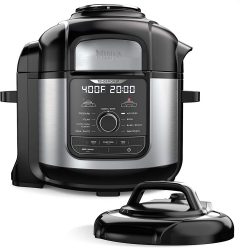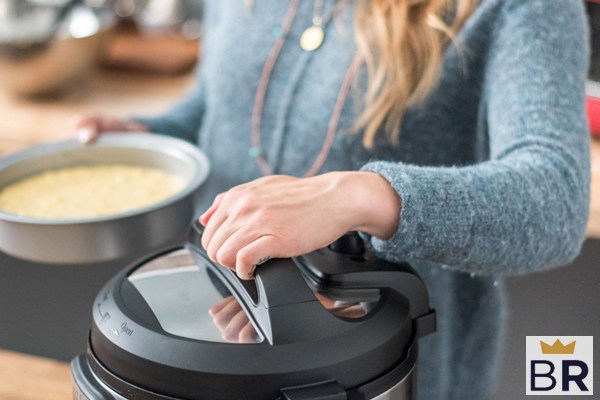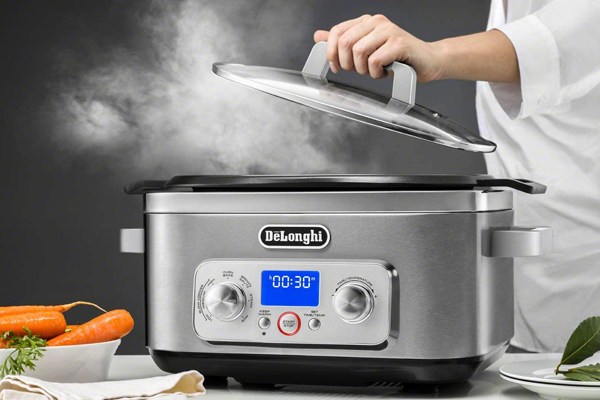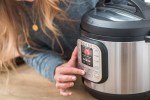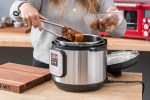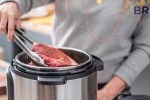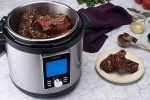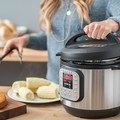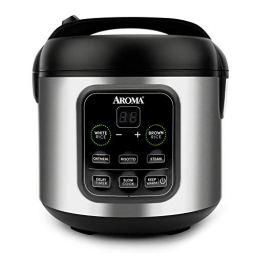Buying guide for best multi-cookers
Multi-cookers have become a kitchen must-have. As the name suggests, they are huge multi-taskers, enabling you to ditch a number of different appliances for just one. These cookers are also good at serving up easy to make healthy food options, and they’ve even become a useful tool for dieters.
The main features in these gadgets are a slow cooker — a “set it and forget it,” which cooks food throughout the day — and a pressure cooker, which uses high heat to speed up the cooking process. Some multi-cookers also have self-stirring options, a rice cooker, air fryer, roaster, steamer and saute setting, to name just a few.
The Instant Pot is the name brand that’s best known, but we’ve also looked at several of the top-performing contenders. Apart from choosing one that has the cooking features you are interested in, check for ease of use in understanding the programming. Easy clean-up is also a plus.
When looking for the best multi-cookers, we note how many features each model offers and how well those features work.
A straightforward control system is one of the things we look for in our search for the top multi-cookers for home use.
We pay close attention to the craftsmanship, design, and consistency of both low-cost and high-end multi-cookers.
We look at a variety of multi-cooker sizes, including compact options for individuals or couples and large models designed to feed a family.
You can use a multi-cooker to prepare an all-day roast. An accurate thermostat, optional delayed start, and in-depth timing capabilities are important factors to look for if this is one of your cooking goals.
We give special consideration to multi-cookers that offer high-temperature searing. This feature can reduce the number of pans and appliances you need to cook dinner.
When assembling our shortlist of the best multi-cookers, we carefully note how easy each one is to clean after everyday use and in case of spills.
We judge multi-cookers, in part, by their ability to perform simple tasks like steaming rice with reliability.
Some multi-cookers offer versatile functions like airfrying and customizable pressure cooking. Bonus points go to multi-cookers with these helpful functions.
Dependability and durability are two highly desirable qualities in a multi-cooker. We include these criteria on our evaluation list.
What can a multi-cooker do?
What is a multi-cooker, anyway? And what are the multiple ways in which it can cook?
Unfortunately, we can't give you a one-size-fits-all answer, since multi-cookers are all slightly different.
Check the manufacturer's specifications on the model you're interested in to find out which of the following functions it performs.
Pressure-cooking
Slow-cooking
Rice-cooking
Steaming
Sautéing
Yogurt-making
Warming
Reducing
Baking
Grilling
- Air-frying
What to consider when choosing a multi-cooker
Capacity
How large you need your multi-cooker to be depends on how many people you regularly cook for.
Multi-cookers generally range in capacity from two to eight quarts. A two-quart multi-cooker is perfect when cooking for one or two; a four- or six-quart model works well for small to medium families; and an eight-quart model is best for a large family or someone who entertains guests frequently.
"If you like having lots of leftovers, it's best to buy a multi-cooker that holds several quarts more than you actually need for a meal."
STAFF
BestReviews
Pressure settings
The built-in pressure cooker is one of the most important features a multi-cooker offers. Without it, a multi-cooker would basically be a glorified slow cooker.
Some multi-cookers feature multiple pressure settings, so you can choose to cook under a higher or lower pressure. This can be useful when you're following a recipe, as most pressure cooker recipes indicate the degree of pressure to which your appliance should be set.
Did you know?
The amount of pressure your multi-cooker puts on food is measured in pounds per square inch, or psi. Multi-cookers with a lower psi take longer to pressure-cook food; you may need to adjust certain recipes to reflect this.
STAFF
BestReviews
Programs
Many multi-cookers have programs built into them for things like risotto, soup, beans, and oatmeal. Simply press a button or select from a digital display, and the appliance will cook the selected item for the correct amount of time.
The number of available preset programs varies from model to model, so you need to decide whether or not you require a wide range.
Timer
The timer allows you to set the amount of time you need to cook your dish, after which your multi-cooker will switch itself off.
This comes in handy if you don't want to use a preset program but won't necessarily be around to manually turn off the multi-cooker at a designated time.
"Your multi-cooker’s timer will count down, showing you how much cooking time is left before the food is done. This is helpful when coordinating your cooking so that separate dishes are ready at the same time."
STAFF
BestReviews
Delayed-start function
If you'd like to come home to a piping hot, ready-to-eat meal, the delayed-start function is a godsend.
Say you want to slow-cook a recipe for four hours and eat at 7 p.m., but you plan to be out all afternoon. You could place the ingredients in your multi-cooker before you leave, set the delayed-start timer so the dish will start cooking at 3 p.m., and expect to find your meal ready and waiting when you return.
Did you know?
For food safety reasons, the delayed-start function can only be used if the ingredients in the dish you're cooking can be left at room temperature for several hours without spoiling. Therefore, animal products are out of the question.
STAFF
BestReviews
Multi-cooker tips
Getting started with a multi-cooker can be daunting, but these tips will help you get cooking fast.
When using your multi-cooker for sautéing, be sure to preheat the unit before adding the oil and ingredients.
In slow cooker mode, you may need to add more herbs and seasoning than usual, as seasoning loses flavor over a long cooking period.
Regularly check the pressure valve to make sure it's not blocked with food residue. A blocked valve will cause too much pressure to build up inside the multi-cooker when in pressure cooker mode, and it could break.
To avoid your food bubbling over the top of the unit, don't add ingredients over the max fill line. And when using pressure cooker mode, fill your multi-cooker no more than two-thirds full, since empty space is needed to create pressure.
- Except for sautéing, you always need a liquid in your recipe when cooking in a multi-cooker. Otherwise, the ingredients are likely to burn.
Multi-cooker prices
During the course of our research, we found multi-cookers to suit all budgets. For most people, a mid-range option would suffice, but if you want lots of added extras, look to the high-end models.
Inexpensive multi-cookers
Most inexpensive multi-cookers are fairly basic with only a handful of preset programs. They're likely to be made by a lesser-known manufacturer and may not be especially durable or long-lasting. That said, you can find some well-made units in this price range, but they're going to be on the small side — just two or three quarts. Expect to pay $60 to $90 for a multi-cooker of this caliber.
For your safety
If a multi-cooker is opened while still under pressure, the food inside will explode everywhere. For this reason, a good locking system is critical.
STAFF
BestReviews
Mid-range multi-cookers
Mid-range multi-cookers tend to be of high quality but with fewer bells and whistles than the priciest models. You can find respected name brands in this price range, even if it’s a larger six- or eight-quart unit you seek. A multi-cooker in this price range should cost between $90 and $150.
Expensive multi-cookers
Expensive multi-cookers are the crème de la crème of the multi-cooking world. These models tend to hold six quarts or more, but their main selling point is that they're extremely programmable with many presets and a host of extra features, from hands-free pressure release to Bluetooth connectivity. A top-end model like this could set you back anywhere from $150 to $300.
FAQ
Q. What safety features should my multi-cooker have?
A. Multi-cookers are relatively safe appliances. However, since a multi-cooker can act as a pressure cooker, we recommend choosing one with a lid that has a locking system so that it can't be removed while the cooker is under pressure. This should be standard in the majority of models, but it's worth double-checking, especially if you're going for an inexpensive option.
Q. Could I slow-cook a dish throughout the day and have it warm and ready when I get home?
A. Most multi-cookers have a delayed-start function that allows you to program the time you'd like to start cooking. However, this function isn’t safe to use if your dish contains ingredients that shouldn’t be left out at room temperature, such as meat and dairy products. In these cases, you could set your multi-cooker to switch to the “keep warm” function after it's done cooking. This strategy will keep your finished food at a safe temperature (without overcooking it) until you’re ready to eat.


